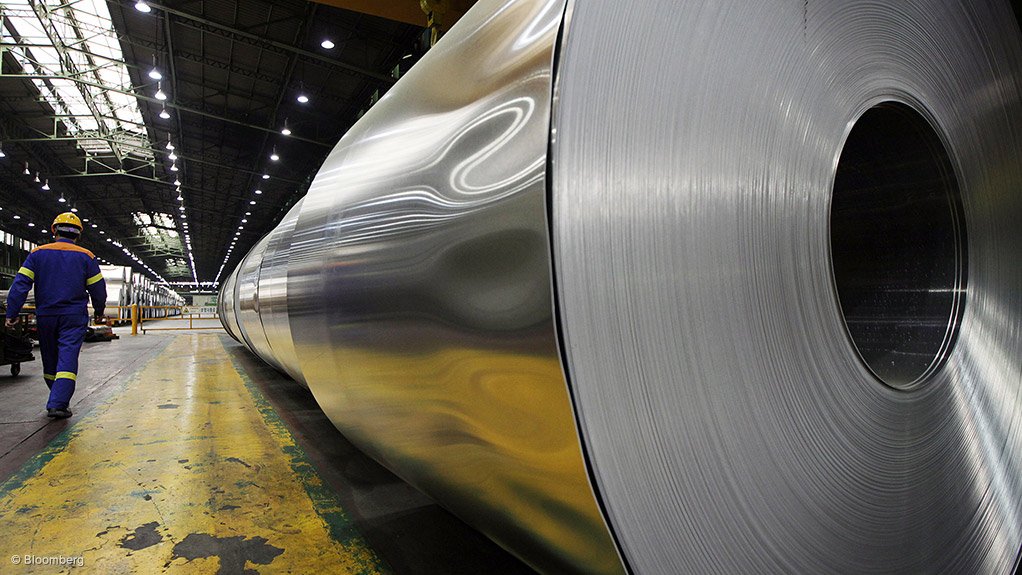Local aluminium demand can double in the next five years


BENEFICIATION NEED Rather than exporting the sheet and rolled aluminium products, the local aluminium industry can focus on more value addition
Photo by Bloomberg
Aluminium industry body Aluminium Federation of South Africa (Afsa) predicts a doubling in local demand for rolled aluminium products in the next five years and a subsequent increase in employment for the industry.
“Exciting potential for the future remains, as the aluminium industry is an essential component to the future strategic development of the South African and global economy,” Afsa director Mark Krieg tells Engineering News.
With the drive towards increasing energy efficiency, aluminium – being a lightweight material weighing about 60% less than steel – offers several benefits to various industries. It reduces fuel consumption and is a good conductor of electricity for use in high-voltage transmission lines and in busbars; it is also a good conductor and insulator of heat for use in construction to improve energy efficiency, Krieg emphasises.
Of the 171 000 t of aluminium used in the South African market in 2013, Afsa estimates that about 15.9% of aluminium products were used in the packaging market, about 21.6% in the electrical market and about 14.2% in the automotive industry.
Further, owing to local beverage can manufacturer Nampak Bevcan’s decision to convert its tin-plated steel cans to aluminium cans since July last year to promote recycling and facilitate job creation, more opportunities have been created for the local aluminium industry to increase volume production, Krieg points out.
“Moving forward, local industry, which currently uses about 54 000 t of rolled aluminium products, can increase this volume by another 40 000 t, which can also be recycled,” Krieg says, noting that realising these volumes will result in a significant increase of rolled product use.
While the ramp-up of increased aluminium use in industry is expected to be slow, Krieg expects that the aluminium industry can and will divert some of the 140 000 t of semifabricated aluminium products that are currently exported to local industry to “easily meet local demand”, or that production at aluminium product manufacturer Hulamin’s operations in Pietermaritzburg, KwaZulu-Natal, will be increased.
Additional industry prospects also stem from the decision to build the new C-Class Mercedes Benz using aluminium body parts and components, Krieg notes.
Therefore, Afsa will display and highlight aluminium components that are locally produced for the new C-Class Mercedes, which include body panels and heat exchangers, at the South African Automotive Week trade show, in Johannesburg, next month.
“The entire aluminium value chain is local, from the primary metal to the rolling slab and rolling technologies, which is a significant achievement,” Krieg says.
He notes that the industry also produces castings, such as cylinder head castings and cam shafts, while the suspension components for the C-Class Mercedes are forged locally and the wheels are also made locally.
Further, Krieg stresses the need for additional aluminium product beneficiation in the country. “Rather than exporting the sheet and rolled aluminium products, the local aluminium industry can focus on more value addition, as the possibility exists to create a full value chain.”
Future Opportunities
While the aluminium potlines at mining giant BHP Billiton’s Bayside aluminium smelter, in KwaZulu-Natal, closed in 2008 after more than 40 years of production, Krieg still highlights the beneficiation opportunities of the Bayside smelter’s cast house.
Currently, only rolling slab for flat products is produced at the Bayside cast house. However, if the cast house can be “resurrected” to produce extrusion billets and redraw rods, local industry would benefit significantly as it would enable the industry to complete the full value chain by providing high-quality products for the market, Krieg emphasises.
Materials, such as extrusion billets, are imported, with aluminium extrusion imports increasing by 80% – from 8 000 t in 2010 to 15 000 t in 2012.
“If extrusions and redraw rods can be locally produced, industry would have high-quality material available for the local fabricators, which, in turn, would increase their competitiveness in the markets,” Krieg says, noting that this would also stem competition from international manufacturers and low-cost imports.
Global Participation
While current aluminium production currently exceeds global demand, which Krieg believes has been a key reason for the suppressed aluminium prices that fluctuated between the LME price of about $1 700/t and $1 800/t, until prices increased in the past two months to about $2 000/t, he notes that industry expects global demand to likely double over the next ten years.
This increase in demand can be attributed to the shutdown of several aluminium smelters in Europe, the increasing use of aluminium in the automotive sector and the new aircraft contracts for aeroplane manufacturers Boeing and Airbus, he says.
Krieg stresses the importance of the South African aluminium industry having the opportunity to share in the growth expected from this demand, noting that the challenges will stem from whether local industry can compete in and also supply the global aluminium industry.
He says, however, that there is significant opportunity for South Africa to manufacture and produce aluminium castings and components for the local and global market, “as the industry still has the expertise, skills and capability”.
Comments
Press Office
Announcements
What's On
Subscribe to improve your user experience...
Option 1 (equivalent of R125 a month):
Receive a weekly copy of Creamer Media's Engineering News & Mining Weekly magazine
(print copy for those in South Africa and e-magazine for those outside of South Africa)
Receive daily email newsletters
Access to full search results
Access archive of magazine back copies
Access to Projects in Progress
Access to ONE Research Report of your choice in PDF format
Option 2 (equivalent of R375 a month):
All benefits from Option 1
PLUS
Access to Creamer Media's Research Channel Africa for ALL Research Reports, in PDF format, on various industrial and mining sectors
including Electricity; Water; Energy Transition; Hydrogen; Roads, Rail and Ports; Coal; Gold; Platinum; Battery Metals; etc.
Already a subscriber?
Forgotten your password?
Receive weekly copy of Creamer Media's Engineering News & Mining Weekly magazine (print copy for those in South Africa and e-magazine for those outside of South Africa)
➕
Recieve daily email newsletters
➕
Access to full search results
➕
Access archive of magazine back copies
➕
Access to Projects in Progress
➕
Access to ONE Research Report of your choice in PDF format
RESEARCH CHANNEL AFRICA
R4500 (equivalent of R375 a month)
SUBSCRIBEAll benefits from Option 1
➕
Access to Creamer Media's Research Channel Africa for ALL Research Reports on various industrial and mining sectors, in PDF format, including on:
Electricity
➕
Water
➕
Energy Transition
➕
Hydrogen
➕
Roads, Rail and Ports
➕
Coal
➕
Gold
➕
Platinum
➕
Battery Metals
➕
etc.
Receive all benefits from Option 1 or Option 2 delivered to numerous people at your company
➕
Multiple User names and Passwords for simultaneous log-ins
➕
Intranet integration access to all in your organisation



















